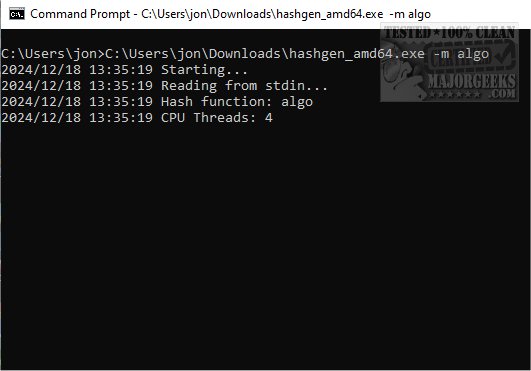Hashgen is a command-line utility specifically designed for the rapid and efficient generation of file hash codes. With its user-friendly design, hashgen caters to individuals with varying levels of experience in command-line operations, enabling seamless access to its features.
Key Features of Hashgen:
1. Multiple Algorithms: Hashgen supports various hashing algorithms, making it ideal for tasks such as file integrity verification, data security assurance, and consistency maintenance during file transfers. Users can quickly generate hash codes for multiple files with minimal effort through its streamlined command-line interface.
2. Comprehensive Documentation: The utility includes extensive documentation that outlines a variety of commands available in the developer's repository. These guides assist users in navigating the numerous functionalities offered by hashgen.
3. Getting Started: To use hashgen, users simply need to specify their desired mode, input the wordlist, and designate an output file for the generated hash. The command-line syntax is straightforward, allowing for the incorporation of various arguments into the hash generation process. Upon executing commands, hashgen generates detailed logs to track actions performed step-by-step.
4. Base64 Encoding/Decoding: In addition to hashing, hashgen supports encoding and decoding operations, particularly with base64 formats and several other hashing formats. This versatility allows users to handle multiple data transformations effectively, making hashgen a valuable asset for cryptographic operations and data security tasks.
User Verdict: Hashgen stands out as an ideal solution for those looking for a straightforward yet powerful hash generator. It combines rapid hashing performance with a wide array of features for encoding and decoding data across different formats. Whether users prioritize swift hash generation or navigating various encoding methods, hashgen consistently meets these needs with reliability and efficiency.
Additional Features:
- Supports multiple hashing functions.
- Can encode and decode base64.
- Accepts ASCII, UTF-8, and $HEX[] wordlist inputs.
- Can dehex a wordlist when set to mode "-m plaintext," outputting it in plaintext format.
Conclusion: The release of Hashgen 1.1.2 enhances the utility's capabilities, solidifying its position as a crucial tool for anyone involved in file hashing and data security tasks. Its combination of speed, versatility, and user-friendliness makes it a must-have for both novices and experienced users alike
Key Features of Hashgen:
1. Multiple Algorithms: Hashgen supports various hashing algorithms, making it ideal for tasks such as file integrity verification, data security assurance, and consistency maintenance during file transfers. Users can quickly generate hash codes for multiple files with minimal effort through its streamlined command-line interface.
2. Comprehensive Documentation: The utility includes extensive documentation that outlines a variety of commands available in the developer's repository. These guides assist users in navigating the numerous functionalities offered by hashgen.
3. Getting Started: To use hashgen, users simply need to specify their desired mode, input the wordlist, and designate an output file for the generated hash. The command-line syntax is straightforward, allowing for the incorporation of various arguments into the hash generation process. Upon executing commands, hashgen generates detailed logs to track actions performed step-by-step.
4. Base64 Encoding/Decoding: In addition to hashing, hashgen supports encoding and decoding operations, particularly with base64 formats and several other hashing formats. This versatility allows users to handle multiple data transformations effectively, making hashgen a valuable asset for cryptographic operations and data security tasks.
User Verdict: Hashgen stands out as an ideal solution for those looking for a straightforward yet powerful hash generator. It combines rapid hashing performance with a wide array of features for encoding and decoding data across different formats. Whether users prioritize swift hash generation or navigating various encoding methods, hashgen consistently meets these needs with reliability and efficiency.
Additional Features:
- Supports multiple hashing functions.
- Can encode and decode base64.
- Accepts ASCII, UTF-8, and $HEX[] wordlist inputs.
- Can dehex a wordlist when set to mode "-m plaintext," outputting it in plaintext format.
Conclusion: The release of Hashgen 1.1.2 enhances the utility's capabilities, solidifying its position as a crucial tool for anyone involved in file hashing and data security tasks. Its combination of speed, versatility, and user-friendliness makes it a must-have for both novices and experienced users alike
hashgen 1.1.2 released
hashgen is a Command Line utility designed to swiftly and efficiently generate file hash codes.


